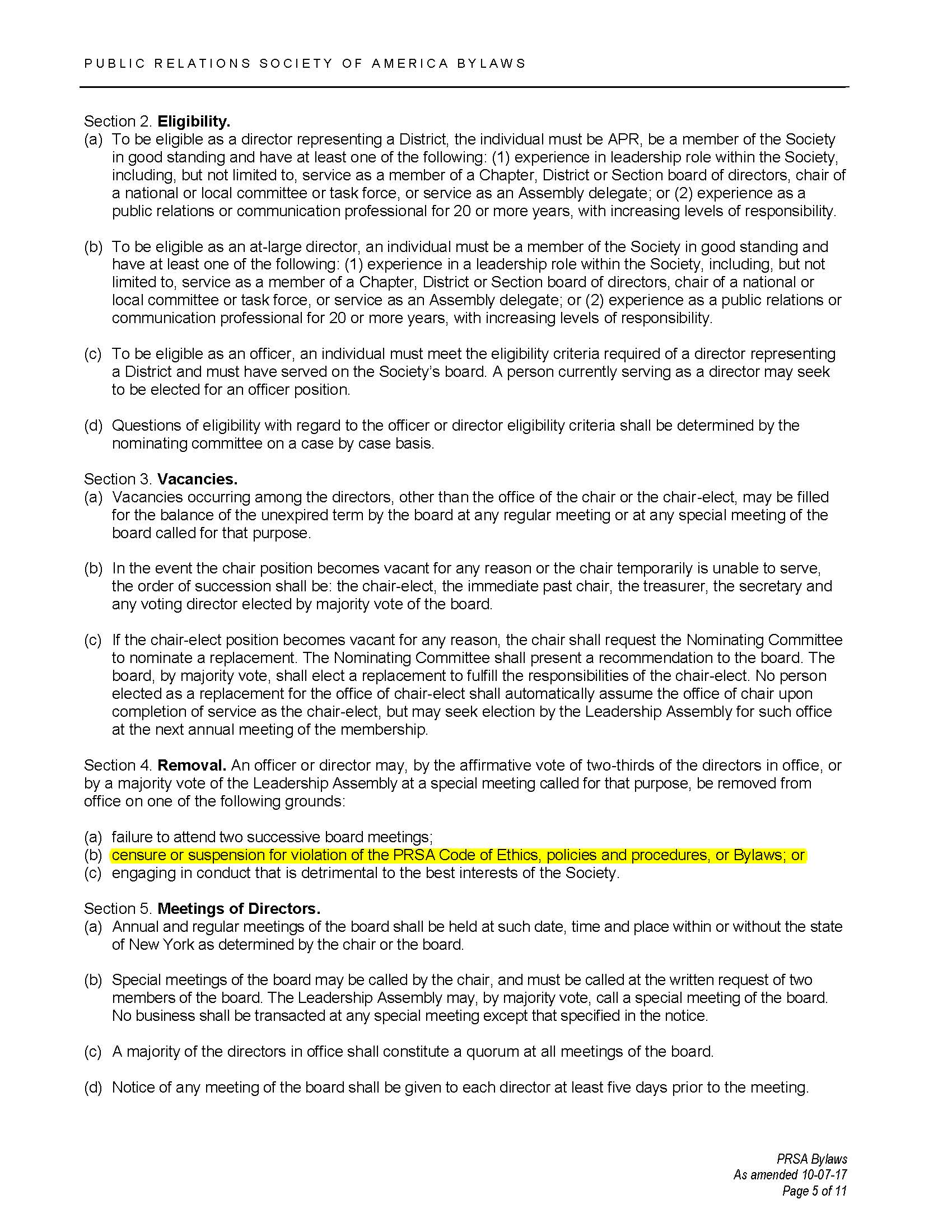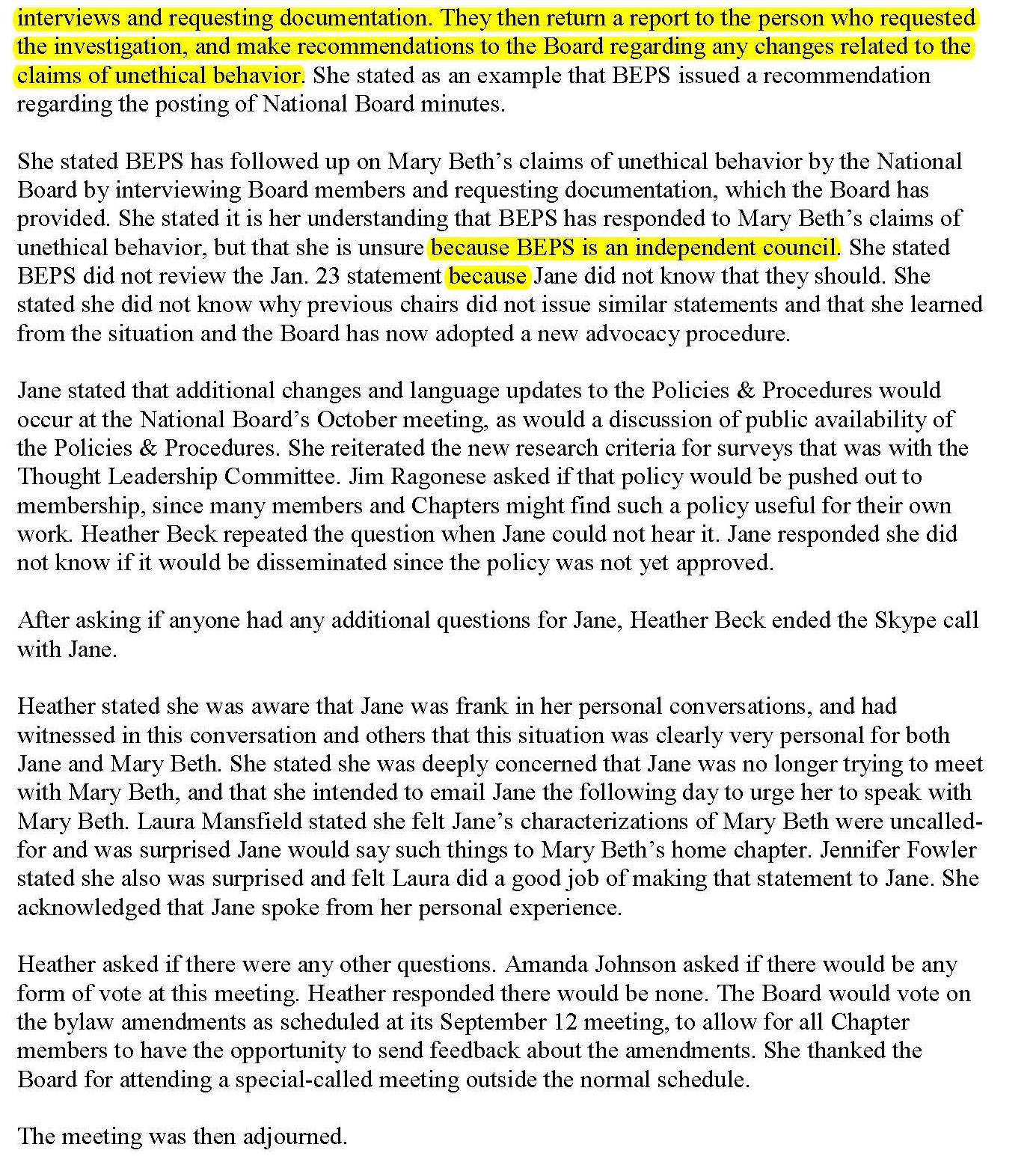In three months as of this writing, the PRSA National Assembly will gather in Austin, Texas, to debate and vote on new bylaw proposals . . . several of which focus on ethics reforms proposed by my colleague, Susan Hart, APR, Fellow PRSA, and me – aimed at correcting major systemic flaws in PRSA’s ethical compliance and accountability functions.
However, before such a significant task can be undertaken in a fully informed manner, it’s critical for ALL PRSA members to share a uniform, unified understanding of the Society’s ethical foundation and how it works (or doesn’t work).
Assembly delegates also need to share this understanding – without which, related governance decisions at the National Assembly will always be in discord and disarray.
PRSA’s Code of Ethics is shepherded by a Board of Ethics & Professional Standards (BEPS) – with the word “board” implying a fully independent, autonomous governance-mandated entity with specific functions of judgment and adjudication relative to ethics issues and infractions. Indeed, BEPS is set forth though PRSA bylaws provision (Article XII, Section 1., Items a and b).
Problem is, PRSA’s and BEPS’s approach to ethics is rife with mixed messages, conflicting signals and a veritable quagmire of unclear directives – all begging the question:
Are PRSA’s ethics a “must-do,” a “good-to-do,” or a “whatever-you-want-to-do, whenever-you-want-to-do-it” proposition for its own members?
Let’s look at objective definitions of selected wording and the understandings / expectations such nomenclature conjures for the average, thinking person:
- Merriam-Webster defines the term, “Code of Ethics” as (bold / italics added for emphasis): “a set of rules about good and bad behavior,” with the word “Code” further specified as “a systematic statement of a body of law.”
- Merriam-Webster further defines the term “rules” as “one of a set of explicit or understood regulations or principles governing conduct within a particular activity or sphere.” It also defines “law” as “the system of rules that a particular country or community recognizes as regulating the actions of its members and may enforce by the imposition of penalties.”
For many decades, the Society has managed a Code of Ethics. Pre-2000, the Code included a compliance-and-accountability function with enforcement provisions. That changed in 2000.
Use of the word “Code” in the “PRSA Code of Ethics” implies that the ethical standards PRSA puts forth are specifically rules-based. Commonly held notions of “rules” by most people – engendered through teachings extending back to pre-school days – hold that “rules” cannot be broken and will not be broken without direct consequences for such behaviors.
Trouble arises in PRSA’s continued use of enforcement-implied nomenclature (as well as literal statements promising enforcement) running alongside its non-enforcement ethics model, which, combined, inherently confuses expectations of enforcement and is now causing great divisiveness within the organization:
- PRSA pitches the value of membership on its website to potential new members (and urges applicants to “gain employer approval” by extending this pitch to supervisors) as one in which public relations professionals who opt in to PRSA affiliation can “Stand behind a Code of Ethics that offers values, principles and practice guidelines that define professionalism and success.”
- A signed statement of allegiance and compliance to the Code is a required criterion for PRSA membership.
- Current PRSA bylaws refer to enforcement of PRSA’s Code of Ethics with such wording as “disciplinary actions concerning violations of the PRSA Code of Ethics” (Article XII, Section 1, Item a) and the PRSA board’s authority to “adopt rules of procedure regarding disciplinary actions for violations of the PRSA Code of Ethics; and bar or expel from membership, by a two-thirds vote of the directors in office, any member who violates the PRSA Code of Ethics” (Article XII, Section 2, Item b).




- The Code receives significant treatment for competency testing as part of the Accredited in Public Relations (APR) credentialing process, with “ethics and law” being one of 10 “fundamental knowledge, skills and abilities (KSAs)” of the APR exam.
- Members of PRSA’s College of Fellows must prove they have embraced and followed the Code throughout their 20+ year careers, and possess a spotless reputation for such, as but one criterion for acceptance into the College.
- What’s more, a recent study of PRSA members indicates that the Code of Ethics represents the most important value of membership, ranking No. 1 in the study’s “competitive index.”
- Further, documented meeting minutes of an August 2017 Skype call conducted between PRSA’s 2017 National Chair Jane Dvorak and the PRSA Volunteer Chapter board captured statements made by Chair Dvorak that clearly indicate some level of enforcement role by BEPS, among a host of other conflicting messages:


However, for nearly two decades, PRSA has embraced an education-only “inspirational” model of observing the “Code” – not a model that holds anyone (including PRSA’s own national leadership) accountable for ethics infractions.
Reasoning behind “PRSA’s education versus enforcement strategy” is provided on PRSA’s website under the title, “Why Doesn’t PRSA Identify Code of Ethics Violators and Sanction Unethical Behavior?”
While most PRSA members can probably agree that an educational function to PRSA’s and BEPS’s scope of work is needed, helpful and laudable, this limited charge nonetheless runs afoul of PRSA’s own compliance-oriented language, which PRSA double-speaks through these aforementioned areas, extending from bylaws language and its membership application, to criteria points within PRSA’s professional-progression system and talking points that drive a clear – and far different – member expectation.
If PRSA Cannot and Will Not Enforce Anything Ethics-Wise, A Nomenclature "Do-Over" is in Order
If PRSA is going to go on-the-record across all aspects of organizational operations with this “we can’t and won’t enforce” mantra to its ethics code, then members should demand full follow-through, consistency and transparency to this mandate . . . and then let the chips fall where they may -- including what likely may include a dramatic drop in membership.
With an honest nomenclature change, PRSA leadership must:
- Change the name and identity (including all branding) from PRSA’s “Code of Ethics” to PRSA’s “Guidelines of Ethics.” Let's just call it what it is, thereby being fully truthful and transparent. (Merriam-Webster defines "guideline" as "a line by which one is guided: such as an indication or outline of policy or conduct." Much different meaning and expectation than "a rule.")
- Delete any ethics-abiding promissory language out of its membership application requirements, since pledges apparently are irrelevant toward a PRSA member actually retaining membership amid any ethics infraction they wish to commit, short of being “convicted of, or shall have pleaded “No Contest” to a charge of, a felony or misdemeanor related to the conduct of the public relations or communication profession.” (See PRSA bylaws Article III-Membership, Section 7)
- Purge from current PRSA bylaws all language associated with “disciplinary actions for violations of the PRSA Code of Ethics,” if the Society has no intention of creating policies-and-procedures for managing and delivering on such actions under any circumstance ever. (Note: There are numerous inconsistent references to enforcement sprinkled throughout current PRSA bylaws, which the Hart/West bylaw proposals aim to help fix.)
- Coach PRSA’s own National Board leadership on speaking accurately in public forums and/or to other PRSA leadership and membership groups about Code of Ethics compliance being optional from a pure compliance/enforcement standpoint.
In conclusion, PRSA can’t have it both ways.
PRSA’s credibility-of-voice depends on its organizational promises meshing consistently with member experience. As of now, PRSA’s promises versus behaviors are all over the map, as far as managing the topic of ethics alongside member expectations is concerned.
Susan Hart and I are still waiting on answers to our list of 10 questions dating back to 2017 (“Was it ethical when…?”), which current PRSA leadership is steadfastly ignoring, as of this writing, with the exception of an attempted shot at answering two of the questions by a former National Board member in a MyPRSA Open Forum post, which proved fruitless due to various points of inadequacy of the response (although at least an attempt was made, despite this person's current status as a non-member of the board).
The other option is for PRSA’s National Assembly delegation to adopt all four Hart/West bylaw proposals, and keep the PRSA Code of Ethics as a real "code," not just a set of optional-but-recommended "guidelines."
Four of the Hart/West proposals introduce dynamic, new -- and highly practical, actionable and manageable -- ethics requirements and accountability measures across a host of areas within the Society, from ensuring PRSA national leadership complies with the Code across all of its communications and policy-making, to better managing the Nominations process.
The fifth bylaw proposal we’ve put forward focuses on adding the word “nonpartisan” to PRSA’s organizational statement of purpose and is not necessarily ethics-driven – although it is unethical, we argue, for PRSA to claim non-partisanship if it categorically refuses to integrate such language formally into bylaws in order to safeguard leadership's latitude to utilize PRSA's brand for partisan purposes.
We urge the 2018 National Assembly delegation to think through these issues carefully, ask the tough questions, demand answers from leadership, and claim the Assembly’s rightful authority to exercise control in driving at least a focused accountability model within PRSA requiring PRSA national leadership’s own ethical compliance, which is critical to PRSA’s brand reputation with its own membership – not just with external audiences.
If we don’t have at least that assurance, then what is PRSA really doing here?